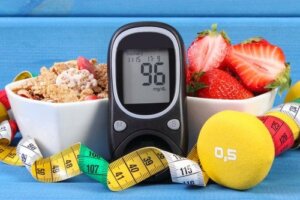Nutrition and Management of Type 2 Diabetes: Recommendations and More


Written and verified by the nutritionist Saúl Sánchez Arias
Type 2 diabetes has become a contemporary endemic disease. Besides not having a cure, it comes with associated complications of various types. It’s a serious health problem that, in most cases, is derived from a poor diet. How can patients improve their nutrition to properly manage type 2 diabetes?
Nutrition and diabetes recommendations
As concluded by a publication in Diabetes, Metabolic Syndrome and Obesity, education about nutrition and diabetes is crucial to properly manage the disease.
Therefore, it’s important that nutritionists and physicians inform patients about topics such as carbohydrate portions, blood glucose control, and the importance of physical exercise.
On the other hand, there are other nutritional recommendations that can be taken into account to address this health problem in regard to the patient’s diet. In any case, it’s important that each patient asks a professional to determine an individual dietary treatment.
Intermittent fasting

One of the main problems resulting from diabetes is the control of the glucose curve. Intermittent fasting, especially 16:8, improves this situation and reduces insulin resistance, according to a review published in Translational Research. Thus, skipping breakfast can be a beneficial strategy in managing diabetes.
Some studies show that a 24-hour fast may also be beneficial. The problem in these cases is that it tends to be less operative due to adhesion problems. Not everyone is able to go that long without eating, especially if they’re subject to some type of physical work.
We must also consider that diabetes is usually associated with excess weight. In these situations, intermittent fasting also becomes a good ally.
Eliminating a daily meal reduces the number of calories in the diet and therefore facilitates weight loss. In this way, a great number of complications associated with overweight and obesity are prevented.
Discover: Intermittent Fasting for Losing Weight and Getting Healthier
Whole foods, keys to nutrition to control type 2 diabetes
Sugar and refined flours are two of the great problems of modern food. They trigger insulin peaks, and favor the onset and lack of control of type 2 diabetes. Opting to reduce eating processed foods as much as possible, and substituting refined flours and cereals for their integral versions are great decisions.
Whole grain foods have a slower rate of intestinal absorption. Thus, sugar passes into the blood progressively and there’s less aggression towards the pancreas. Switching wheat for other cereals of higher quality, such as spelt or quinoa, are interesting strategies when we talk about the prevention and control of diabetes.
Reducing the amount of processed foods in the diet is one of the great milestones of modern nutrition. Since our mouths are so used to large amounts of sugar, it’s often difficult to reduce the amount of sweetness in the diet. Despite this, opting for fresh foods is a great investment in health.
Don’t consume fizzy drinks or alcohol

Both sweetened soft drinks and their zero sugar versions put great stress on the pancreas. The same goes for alcohol and its hypoglycemic capacity. In addition, they promote weight gain and obesity. Thus, removing them from the diet usually produces a decrease in body mass and a notable improvement in the state of health.
On the other hand, alcohol can contribute to a state of dehydration. As we’ll see in just a bit, hydration is fundamental in people with diabetes. Therefore, diabetics should completely avoid alcohol.
Exercise
Exercise is a great ally in the fight against type 2 diabetes. Specifically, as observed in a study published in Current Diabetes Reviews, high-intensity intervallic exercise helps reduce insulin resistance and control body weight. This way, doing exercise regularly becomes a necessary habit in both the prevention and management of this disease.
Combining moderate-intensity exercise with intermittent fasting improves exercise results in terms of glucose control. It reduces insulin resistance and helps fat and body weight loss. As a result, the person’s health is significantly improved.
Staying hydrated
Dehydration is a common problem among people with diabetes. High blood glucose causes increased kidney excretion and thus fluid loss.
It’s important for people with diabetes to always stay well hydrated to avoid major complications. Drinking frequently and not waiting to be thirsty are two basic points in these situations.
Improve your nutrition to control diabetes
It’s important to improve nutrition to help control type 2 diabetes. In this sense, the patient should eat whole foods, stay hydrated, and avoid bad habits, such as alcohol and tobacco consumption. In addition, patients can also explore other options like intermittent fasting, but always make sure the diabetic is under the careful eye of a nutritionist while fasting.
All cited sources were thoroughly reviewed by our team to ensure their quality, reliability, currency, and validity. The bibliography of this article was considered reliable and of academic or scientific accuracy.
- Barnosky AR., Hoddy KK., Unterman TG., Varady KA., Intermittent fasting vs daily calorie restriction for type 2 diabetes prevention: a review of human findings. Trans Res, 2014. 164(4): 302-11.
- Hamasaki H., Interval exercise therapy for type 2 diabetes. Curr Diabetes Rev, 2018. 14(2): 129-137.
- Chester B, Stanely WG, Geetha T. Quick guide to type 2 diabetes self-management education: creating an interdisciplinary diabetes management team. Diabetes Metab Syndr Obes. 2018;11:641–645. Published 2018 Oct 17. doi:10.2147/DMSO.S178556
- Sami W, Ansari T, Butt NS, Hamid MRA. Effect of diet on type 2 diabetes mellitus: A review. Int J Health Sci (Qassim). 2017;11(2):65–71.
- Alkhatib A, Tsang C, Tiss A, et al. Functional Foods and Lifestyle Approaches for Diabetes Prevention and Management. Nutrients. 2017;9(12):1310. Published 2017 Dec 1. doi:10.3390/nu9121310
- Della Pepa G, Vetrani C, Vitale M, Riccardi G. Wholegrain Intake and Risk of Type 2 Diabetes: Evidence from Epidemiological and Intervention Studies. Nutrients. 2018;10(9):1288. Published 2018 Sep 12. doi:10.3390/nu10091288
- Marventano S, Vetrani C, Vitale M, Godos J, Riccardi G, Grosso G. Whole Grain Intake and Glycaemic Control in Healthy Subjects: A Systematic Review and Meta-Analysis of Randomized Controlled Trials. Nutrients. 2017;9(7):769. Published 2017 Jul 19. doi:10.3390/nu9070769
This text is provided for informational purposes only and does not replace consultation with a professional. If in doubt, consult your specialist.








